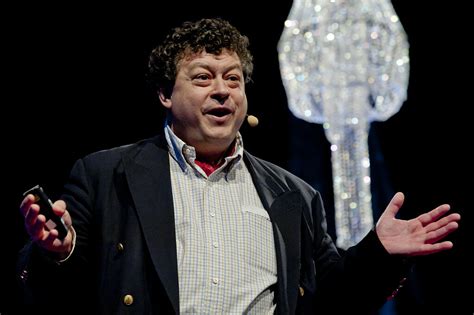A Quote by Susan Jeffers
When we give from a place of love, rather than from a place of expectation, more usually comes back to us than we could ever have imagined.
Related Quotes
Parenting forces us to get to know ourselves better than we ever might have imagined we could--and in many new ways. . . . We'll discover talents we never dreamed we had and fervently wish for others at moments we feel we desperately need them. As time goes on, we'll probably discover that we have more to give and can give more than we ever imagined. But we'll also find that there are limits to our giving, and that may be hard for us to accept.
Immigrants to America help us with the work they do. They challenge us with new ideas, and they give us perspective. This is still the nation that more people around the world want to come to than any place else. That has to tell us something about ourselves. If around the world this is the place people want to come to so much, maybe there's more here than many of us realize-and that many of us can take advantage of.
There is a place where we are always alone with our own mortality, where we must simply have something greater than ourselves to hold onto-God or history or politics or literature or a belief in the healing power of love, or even righteous anger.... A reason to believe, a way to take the world by the throat and insist that there is more to this life than we have ever imagined.
Perhaps extreme danger strips us of all pretenses, all ambitions, all confusions, focusing us more intensely than we are otherwise ever focused, so that we remember what we otherwise spend most of our lives forgetting: that our nature and purpose is, more than anything else, to love and to make love, to take joy from the beauty of the world, to live with an awareness that the future is not as real a place for any of us as are the present and the past.
When we enter the landscape to learn something, we are obligated, I think, to pay attention rather than constantly to pose questions. To approach the land as we would a person, by opening an intelligent conversation. And to stay in one place, to make of that one, long observation a fully dilated experience. We will always be rewarded if we give the land credit for more than we imagine, and if we imagine it as being more complex even than language. In these ways we begin, I think, to find a home, to sense how to fit a place.
But I'd rather help than watch. I'd rather have a heart than a mind. I'd rather expose too much than too little. I'd rather say hello to strangers than be afraid of them. I would rather know all this about myself than have more money than I need. I'd rather have something to love than a way to impress you.
In patriarchal culture men are especially inclined to see love as something they should receive without expending effort. More often than not they do not want to do the work that love demands. When the practice of love invites us to enter a place of potential bliss that is at the same time a place of critical awakening and pain, many of us turn our backs on love.
Avarice, greed, concupiscence and so forth are all based on the mathematical truism that the more you get, the more you have. The remark of that it is more blessed to give than to receive is based on the human truth that the more you give away in love, the more you are. It is not just for the sake of other people that tells us to give rather than get, but for our own sakes too.
I'm actually in a funny place now where I'm more secure than I've ever been. My career is more stable than it's ever been and that's nice, but it's put this thought in my mind where I'm like, "I have more to lose now." I still have to remind myself that I can't be quiet and back away from the things that have got me here, which is kind of doing it my way and not necessarily caring what the consequences are. A lot of that comes back to music.
Those who wish to change things may face disappointment, loss, or even ridicule. If you are ahead of your time, people laugh as often as they applaud, and being there first is usually lonely. But our protection cannot come between us and our purpose. Right protection is something within us rather than something between us and the world, more about finding a place of refuge and strength than finding a hiding place.






































